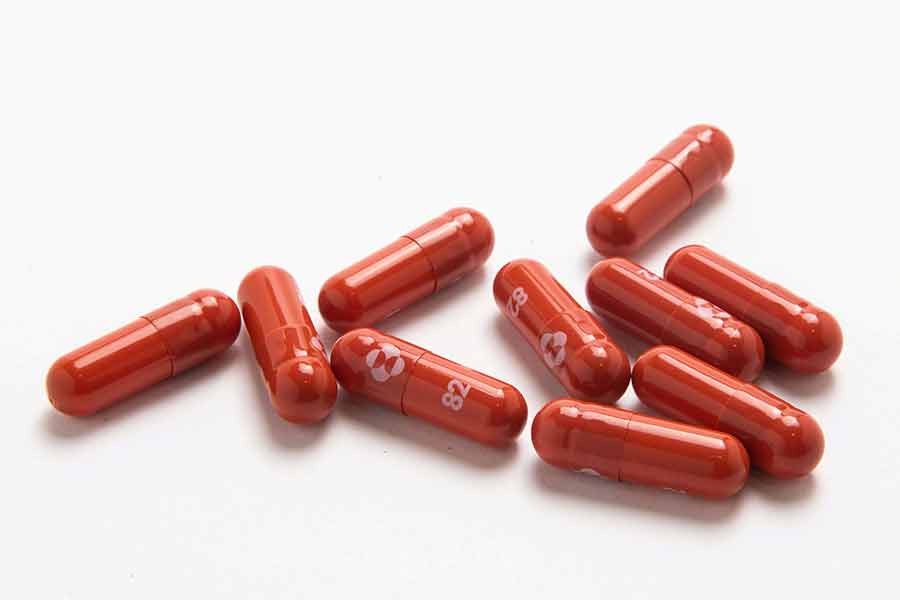
Published :
Updated :

Bangladesh's drug control authority, the Directorate General of Drug Administration, (DGDA), has given permission to four local drug companies, the Beximco Pharmaceuticals and the Eskayef Pharmaceuticals, to manufacture and market the world's first-ever oral anti-Covid-19 drug, molnupiravir. Developed by the American drug companies, Merck & Co. and the Ridgeback Biotherapeutics, the drug was awaiting emergency use authorisation in the USA. However, Britain has taken the lead by giving the anti-COVID drug approval for use in the UK. So, with this go-ahead signal for the drug's local use, Bangladesh will be among the pioneers in popularising the drug in this part of the world.
But what is so especial about the drug to merit so much publicity and attention? Don't we already have the anti-COVID drugs like the remdesivir developed by Gilead Science and the monoclonal antibody mix made by the biotech company, Regeneron Pharmaceuticals, already in the market? In fact, the reason for this added interest in this new drug is that it can be administered orally. Further, a person can start the drug's use upon a physician's advice as soon as she/he is tested positive for the COVID virus. For the other two earlier mentioned preparations, on the other hand, the COVID-infected person has to be injected with the drugs. What is more, those drugs are applied when the patients have already been hospitalised. But as is often the case, at an advanced stage of the infection the chances of a patient's survival diminishes markedly. So, this remains a big challenge for any anti-viral drug to save patients when they reach a critical stage of their infection. But the advantage of this new, orally applicable antiviral drug is that the progress of the disease can be halted before it can reach a critical stage.
Obviously, the oral anti-COVID pill is a great leap forward in humanity's struggle against the Covid-19 pandemic. But how did the researchers come across the science of this new formulation against the coronavirus? In fact, the anti-viral drug, molnupiravir, had a very modest beginning. It started as a possible treatment of an encephalitis virus found in Venezuelan horses. The research was being conducted at an Emory University-run non-profit company in the USA. Later in 2015, a decision was taken to test the drug's efficacy against coronaviruses. It would be worthwhile to note at this point that coronaviruses were already known to the scientists. The SARS, or Severe Acute Respiratory Syndrome, was first recognised as a global threat in 2003 following an outbreak of the disease in 29 different countries and territories during 2002-04. It was caused by a coronavirus called SARS-associated coronavirus (SARS-CoV) Similarly, MERS (Middle East respiratory syndrome), also called camel flu, is caused by another type of coronavirus (MERS-CoV). The syndrome was first detected in Saudi Arabia in September 2012. Researchers found that the drug worked against diverse types of coronaviruses including MERS. It was then applied against influenza and other respiratory viruses. However, after the appearance of the Covid-19, the focus of the research then turned to this new pandemic. First applied to pandemic-infected ferrets, it was found that the drug did not only stop the virus's ability to replicate in the infected body, it could also suppress the transmissibility of virus from the infected body to the uninfected ones. But how does the drug perform this miracle in a human body? The drug, molnupiravir, once it enters a human body, begins to duplicate the pandemic's RNA and causes the virus to mutate into a new virus which is basically a dud. This process finally leads to the total collapse of the process of the pandemic's multiplication in the victim's body. The other pre-existing antiviral drugs, for example, remdesivir, on the other hand, disrupts the RNA chains from building by stopping the enzyme responsible for the process.
However, in the case of the new drug, scientists term the process by which it works 'lethal mutagenesis' which is as good as 'mutating the virus to death.' Another redeeming feature of the drug is that it attacks the coronaviruses in a victim's body in a random fashion. So, the lack of a pattern in the drug's choosing of target viruses confuses the latter so much so that they are unable to raise an effective defence against the drug. So far so good. But one needs also to be aware of the flip side of the drug, if any. To be fully assured, we will have to wait until all the data on the antiviral drug's impact on human genome is in hand.
Now that the anti-Covid-19 drug would soon appear on the local drugstores' shelves, the public would require doctor's prescription and advice before it can be used by a COVID patient. Overall, the drug's production and marketing locally is going to provide the public with another weapon to fight the deadly pathogen, the SARS-CoV-2. Though not an alternative to the vaccine, yet the formulation, molnupiravir, will go a long way in addressing the helplessness of the country's COVID patients.
sfalim.ds@gmail.com


 For all latest news, follow The Financial Express Google News channel.
For all latest news, follow The Financial Express Google News channel.